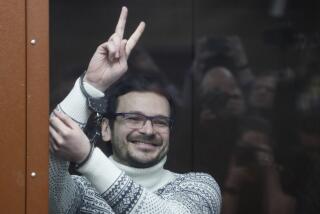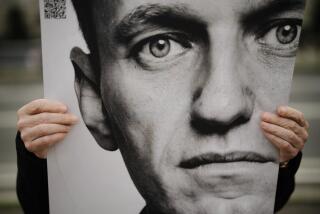Soviets Vague on Gorbachev’s Whereabouts
MOSCOW — As the international community and the people of the Soviet Union demanded to hear from Mikhail S. Gorbachev, the leaders of the hard-line group that ousted him Monday said the Nobel Peace Prize laureate is safe but implied that they would not permit him to speak for himself.
Gorbachev, who led the Soviet Union through a dramatic transformation from a closed, totalitarian state to a country with free elections and a multi-party political system, was replaced early Monday by his vice president, Gennady I. Yanayev, and an Emergency Committee. An official announcement attributed the change to Gorbachev’s poor health.
Yanayev gave only vague answers when reporters pressed him at a news conference about Gorbachev, whom he referred to as his “friend.”
Gorbachev is “vacationing and undergoing treatment in the Crimea,” a peninsula on the Black Sea, Yanayev said. “He grew very tired, the way he’s worked these past six years, and it will take some time for his health to improve and then he will resume working with us.”
Yanayev’s evasive reply far from satisfied reformers, who were convinced that Gorbachev, 60, is being held against his will by the “Committee for the State of Emergency in the U.S.S.R.,” made up of known archconservatives such as the heads of the KGB security and espionage agency, the Interior Ministry and the military.
Leningrad Mayor Anatoly A. Sobchak, speaking at an emergency meeting of his City Council that was broadcast on Leningrad television, said that he met with members of the committee and learned that Gorbachev had declined when he was told to resign and had demanded to make a television address.
In Moscow, a crowd that gathered at the Russian Parliament building beseeched Boris N. Yeltsin, president of the Russian Federation, to relay any news he had about Gorbachev’s whereabouts and health.
“Today he is blockaded in Phoros,” Yeltsin told reporters, referring to a small resort near Sevastopol in the Crimea. “Communication with him has been cut off and I cannot reach him.”
Constant attempts to reach Gorbachev as late as this morning had been futile, Yeltsin and his spokesmen said. Earlier, a Yeltsin spokesman has described the ousted president as being under house arrest or in detention.
Yeltsin said that on Friday, when he last spoke with him, Gorbachev was in good health and is excited about returning to Moscow for the signing of the Union Treaty, Gorbachev’s plan for a new Soviet federation, which had been scheduled for today.
The Democratic Reform Movement, which is headed by longtime Gorbachev friend and former foreign minister, Eduard A. Shevardnadze, also demanded that the people hear from Gorbachev personally.
“It’s still not clear how this happened,” an appeal by the council of the Democratic Reform Movement said. “It’s not known what happened to the president. If he is sick and cannot fulfill his responsibilities, then a published doctor’s statement (on his health condition) would be necessary.
“If the president in some way took part in what has happened and knew about the preparations for this coup, then he should answer for this because he pronounced an oath and promised to defend the constitution.
“We demand that the president immediately speak before the people.”
The international community was no less impatient to hear from Gorbachev, who was awarded the Nobel Peace Prize earlier this year for his role in ending the Cold War and setting the conditions for peaceful democratic revolutions in Eastern Europe.
German Chancellor Helmut Kohl demanded proof that Gorbachev, whom he considers a personal friend, was alive and well.
In response, Yanayev had letters delivered to Kohl and to French President Francois Mitterrand late Monday assuring them that Gorbachev is “perfectly safe” and “not under any threat.”
The letters also promised that the Soviet Union would continue on its path of reform and honor international agreements.
Asked whether the chancellor was satisfied with Yanayev’s reply, delivered by the Soviet ambassador to Bonn, a spokesman in Kohl’s office said there was no immediate response. The full text of the Moscow letter was not made public.
At an evening news conference in Paris, Mitterrand announced that he had received a letter from Yanayev offering similar reassurances.
Yanayev was asked at the press conference whether Gorbachev would be investigated for wrongdoing.
“He is a man who deserves every respect, certainly not an investigation,” he replied.
More to Read
Sign up for Essential California
The most important California stories and recommendations in your inbox every morning.
You may occasionally receive promotional content from the Los Angeles Times.










